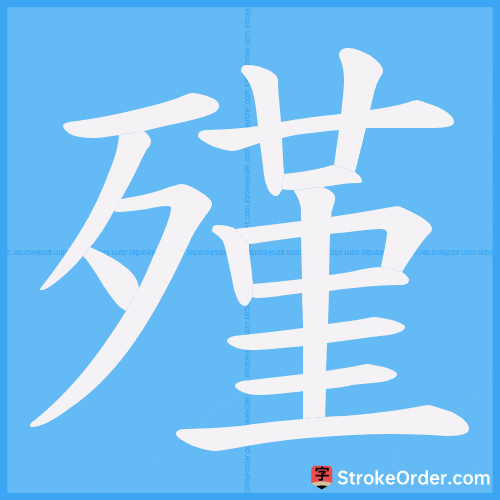殣 Stroke Order
Animated Stroke Order of 殣

Stroke Order Diagrams for 殣

Information of 殣
Pinyin
jìn
Radical
歹
Strokes
15 strokes
Usage
★★
Definition
殣 (jìn)
1. Bury.
2. Die of hunger.
3. Present oneself before.
【本义】: To bury, to entomb.
【造字法】: Phonetic-ideographic character. "歹" indicates a relation to death.
引:
1. 唐·徐彦伯《比干墓》:冤骸悲莫殣。(Translation: The tragic remains can only be buried in sorrow.)
2. 《大戴礼记》:天之饥馑,道无殣者。(Translation: There should be no starvelings when the heavens bring famine.)
3. 《汉书·礼乐志·天门》:神裴回若留放,殣冀亲以肆章。(Translation: When the spirits come down, they are to be presented before.)
名:
A person who dies of hunger (starveling).
引:
1. 《左传》:道殣相望。(Translation: On the road, starvelings can be seen in both directions.)
名:
1. Tomb, grave. 《国语·楚语下》: "The people are weak and starving; the situation has become severe. Throughout the land, starvelings can be seen."
2. 饿死 (to die of hunger). 《大戴礼记·千乘》: "Thus, when the harvest fails, there should be no starvelings in the land."
动:
1. To die of hunger. 《大戴礼记·千乘》: "Therefore, when the harvest fails, there should be no starvelings."
2. To bury, to entomb. 《荀子·礼论》: "One should not adorn the coffin or walk during the day, so as to bury at dusk."
3. 《魏书·卷七·高祖纪下》: "When encountering ruined tombs and exposed coffins on the road, stop the carriage to bury them."